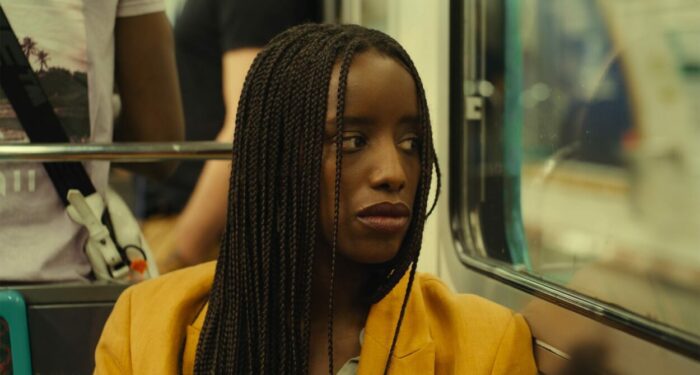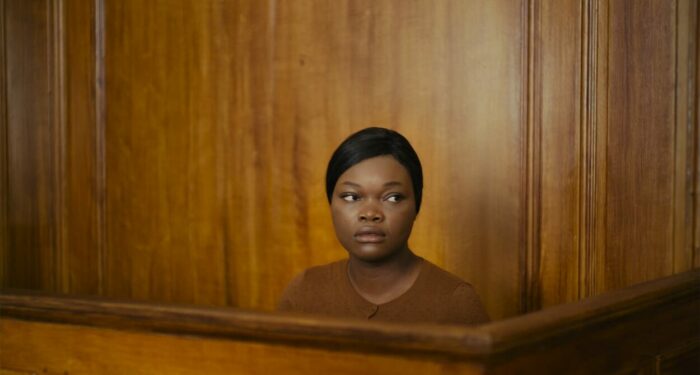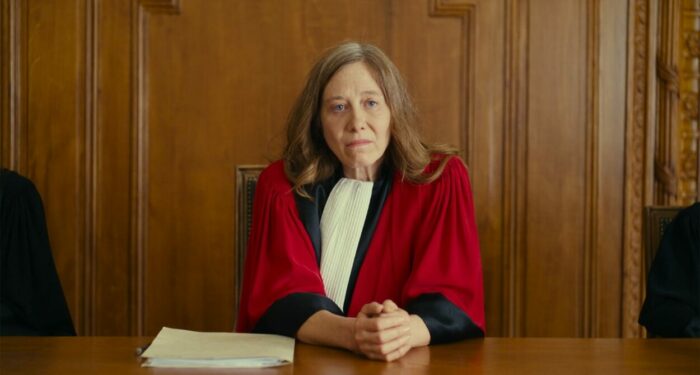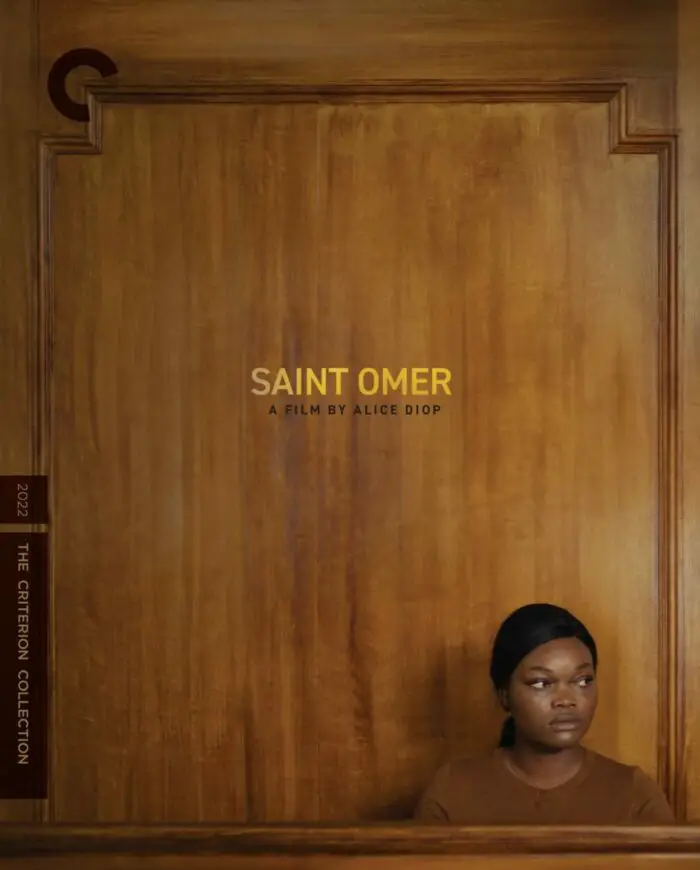Alice Diop’s Saint Omer (2022) is many things at once: a true-to-life tale of infanticide, a tense and gripping if cautiously de-sensationalized courtroom drama, an ambitious updating of Ousmane Sembène’s now-classic La noire de … / Black Girl (1966), a self-reflexive rumination on authorship, a mournful meditation on motherhood, and a postcolonial deconstruction of immigrant alienation. An international festival hit and winner of the Grand Lion at Venice, Diop’s mesmerizing drama finds its way next week onto a new life in The Criterion Collection in a Blu-ray and DVD special edition well worth anyone’s while.
If the plot of Black Girl was striking in its simplicity, with its titular protagonist migrating from Senegal to France to work as a domestic before being objectified and demeaned to the point of suicide by her well-to-do employers, Diop takes this broad outline and updates it to a contemporary setting with a self-reflexivity based on a character loosely aligned with her own perspective as filmmaker. In Saint Omer, bestselling novelist and popular professor Rama (Kayije Kagame) enjoys a life of modest privilege earned through her authorship and is researching her next nonfiction novel, one based on the trial of a young Senegalese woman accused of murdering her infant daughter.

It’s a prime case and exactly the type to attract the attention of a lascivious press. Rama’s intentions may be more aesthetically grounded, as she hopes at first to retell the woman’s story as a modern update of Medea (clips from the 1966 Pasolini film flood her vivid imagination); also attractive to her, perhaps discomfortingly so, are the accused’s parallels with her own personal life as an immigrant academic, alienated from her mother, and living with a native white man. These and an apparent ambivalence towards maternity she shares with the young woman who stands trial and whose story she looks to tell.
Once Rama arrives in Saint-Omer to watch the trial unfold, however, its events give her pause. Following the brief process of jury selection, the accused woman, Laurence Coly (Guslagie Malanda) takes the stand as the judge (Valérie Dréville) reads the charges and the attorneys (Aurélia Petit, Robert Cantarella) conduct their examinations. Diop and cinematographer Claire Mathon construct the trial’s proceedings as a methodical, deliberative affair conducted in the bright light of day: impeccably sharp in detail and starkly austere in movements, the camerawork focuses simply and directly on Rama’s witness of the proceedings, especially Laurence’s testimony.

And what testimony it is. Laurence pleads not guilty, though the evidence against her is nothing short of conclusive. Accused of murdering her infant daughter, she was seen traveling to the scene of the crime with the baby in tow and returning home without; the authorities have the infant’s body, washed up ashore, as well as sufficient corroborating evidence. Laurence, a graduate student who has found herself disowned by her father, estranged from her sister/roommate, and later working as a domestic for a married white man, Luc Dumontet (Xavier Maly), with whom she has been having an affair (hence the similarities to Sembene), pleads, unsurprisingly, not guilty to the charge, but with a surprising caveat delivered with an undaunted conviction. She does not deny having killed the daughter for whom she could not possibly care; however, she claims, she is herself the victim of her own mother’s sorcery.
To a Westerner—and certainly to the prosecuting attorney and likely to many of those attending the trial—such a witchcraft defense seems on the surface absurd. But Malanda delivers her self-defense with such unflinching confidence that, with time, Laurence’s plight becomes to Rama an all-too-common tale of the exploitation of an immigrant woman (and less, if at all, a postmodern Medea). The novelist begins, rightly, to doubt her own initial assumptions about the case in what is safe to assume is a self-reflexive move by Diop as the filmmaker questioning her own authority to tell the story of an immigrant woman whose fate is to be determined by a Western court and jury.
In 2015, Diop herself sat at the trial of Fabienne Kabou, a Senegalese immigrant who claimed that evil forces drove her to drown her 15-month-old daughter Adélaïde at Berck-sur-Mer. Saint Omer does not follow these events exactly, but the director’s inspiration is made clear by the many parallels: Diop’s Laurence is, like Fabienne Kabou, a highly intelligent graduate student in an affair with an artist many decades her senior, driven she says by witchcraft to murder the child she could not keep. (Some of Laurence’s dialog echoes the court testimony of Kabou.) Kabou was quickly convicted to 20 years in prison.

Laurence’s fate in Saint Omer is less certain, in keeping with Diop’s more layered, nuanced approach to the narrative. As the novelist Rama begins to learn from Laurence’s compelling testimony, certitude is rare and the authority to tell such a tale fragile. Rama may well doubt her own ability to “novelize” the facts of Laurence’s case, but the filmmaker Diop fashions from this material a film of stunning clarity and complexity. What results is a drama with more in common with Sembène’s Black Girl, Claude Chabrol’s La Cérémonie, or Chantal Akerman’s Jeanne Dielman, 23 quai du Commerce, 1080 Bruxelle than with most courtroom dramas.
Criterion’s 2K digital master of Saint Omer could not be more richly detailed, presented in its original 1.85:1 aspect ratio in stunning clarity, matched by its DTS HD 5.1 audio soundtrack. Diop’s is a film that eschews the histrionics associated with most courtroom dramas: there are no swooping or crawling dolly-ins, no reaction shots of astonished onlookers, no big speeches or “you-can’t-handle-the-truth!” moments, and no thunderous soundtrack. There is even, in a way, no traditional conclusion to the narrative, just a sober observation that so many immigrant women lack the ability to make choices about their own lives. Diop’s film takes measure of that fact with a clear and calculating lens that focuses unflinchingly on its twin subjects, so adeptly performed by the leads Kagame and Malaga.
Special Features
For this Blu-ray and DVD special edition, Criterion presents no commentary track and very little about the true-life conviction of Fabienne Kabou. But four separate interviews with director Alice Diop and an excellent essay by Jennifer Padjemi make for a careful contextualization of the filmmaker’s intentions, especially for such a newly-minted film.

2022 Interview. This ten-minute interview focuses on universality of Saint Omer‘s theme, based on each primary character’s relationship with her mother and her (prospective or aborted) motherhood. Elegantly shot and lit, conducted in French with English subtitles, the interview is enhanced by a few brief clips from the film. Diop reflects here on the similarities between directing a documentary and a fiction film, noting that she is uninterested in the mundane facts of the crime that inspired the film but in the psychology of the character and the complex relationship between mother and child. “All my documentaries are heavily written, outlined, and directed,” Diop says, claiming there is virtually “no difference” between them and (this) fiction film. This interview speaks directly to her choices both as a co-writer and as a director orchestrating the film’s rich but stark mise-en-scéne.
2023 Interview. This nine-minute audio interview, recorded by Criterion for this physical media release, speaks more directly to Diop’s collaborations with co-writers Amrita David (also the film’s editor) and author Marie NDiaye and to the film’s on-set production. The three of them—none with traditional fiction-script writing experience—fashioned together an unusual approach to the narrative of Saint Omer, one that would lean heavily on the Kabou case but create its own unique story, especially in regards to the composition of the Rama character and her perspective on the events of the trial. Illustrated with clips and behind-the-scenes stills from the making of Saint Omer, this interview provides a fascinating and first-hand insight to Diop’s unusual artistry.
Conversation between Diop and Hélène Frappat. At a full hour the longest of the four interviews, recorded at Maison de la poésie in Paris in July 2023, Diop and Frappat engage in a lively exchange, moderated by host Sylvain Prudhomme, in front of a live audience, their talk conducted in French with English subtitles provided. Frappat, a novelist, film scholar, and translator who met and struck up a friendship with Diop upon seeing her documentary work, is especially interested in the linguistic acts of Saint Omer. Diop shares several incidents of the kinds of casual racism she encountered during the making of Saint Omer that link her to her film’s protagonist. This session, like each of the others, provides an illuminating perspective on the making and interpretation of Saint Omer.
Conversation between Diop and Dee Rees. This 30-minute podcast excerpt, from a 2023 episode of The Director’s Cut – A DGA Podcast, features Rees interviewing Diop about her creative process and the conception of Saint Omer. Rees, the first African American woman nominated for an Academy Award for screenwriting (for Mudbound), proves a savvy interviewer, sensitive to Diop’s unusual approach to writing, shooting, and editing. The presentation consists of the audio interview, conducted in English with the assistance of a translator, with the shot of the film’s empty courtroom setting its only visual. It may not be much to look at, and the work of translation makes the presentation somewhat stilted, but the content, as in each of the above interviews, is excellent.
The jewel case package also includes a foldout booklet featuring Padjemi’s excellent essay, “Shades of Motherhood,” which focuses on the notion of the gaze and the relationships between mothers and daughters in the film. Also included on the disc is the film’s trailer; a new English subtitle translation is provided for the film, and subtitles are provided for three of the four interviews (the Rees interview, conducted predominantly in English, being the exception).
In sum, the special features, in particular the interviews with Diop, let the director speak for herself just as her Saint Omer speaks for its two characters. In Saint Omer Diop lets their visages fill the frame for minutes at a time, the shots unedited and their gazes unyielding. Here in Criterion’s package the special features essentially let Diop do the talking, lending her documentarian’s approach to the making of a film as rich and complex in meaning as any. Rich in allusion and stunning in presentation, Saint Omer is as compelling a film as one will find in The Criterion Collection, and this handsome Blu-ray package does its complexity justice.
Saint Omer, spine no. 1212, is available on Blu-ray (SRP $39.95) and DVD ($29.95) for a discounted pre-order directly from The Criterion Collection. The disc releases March 26, 2024.




